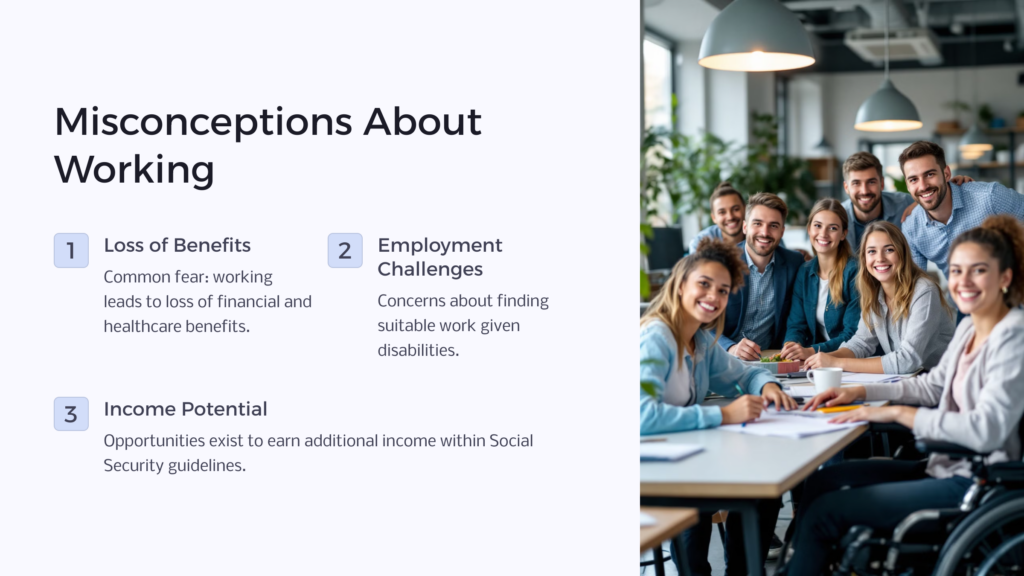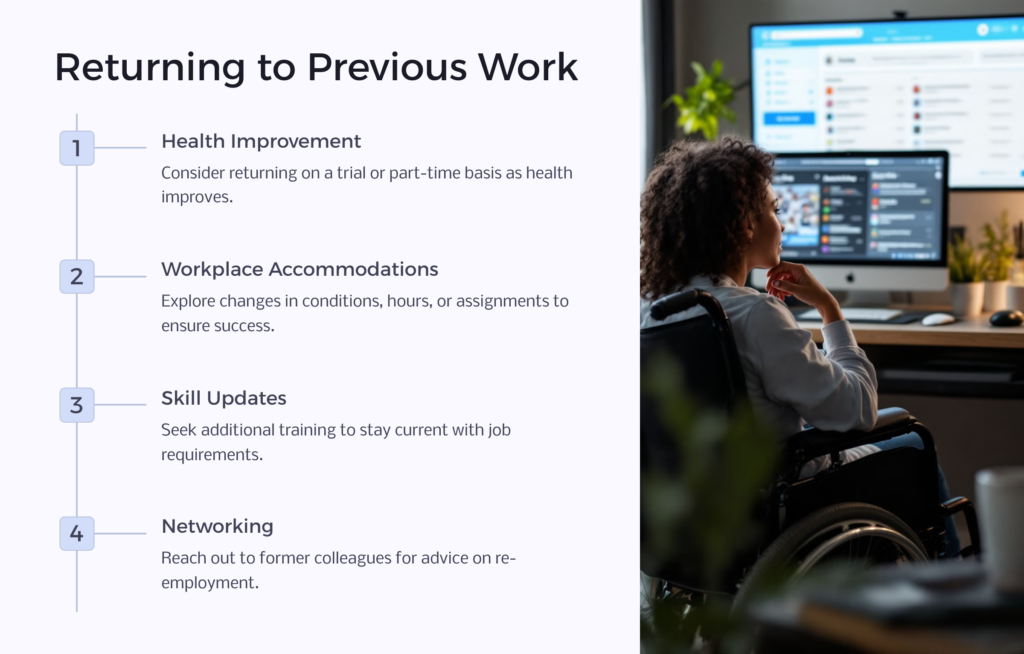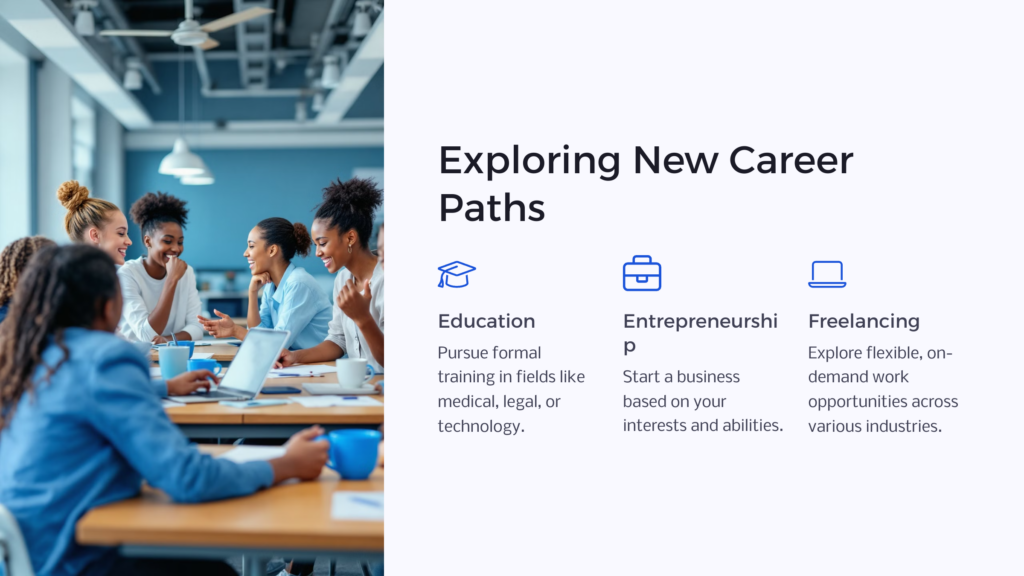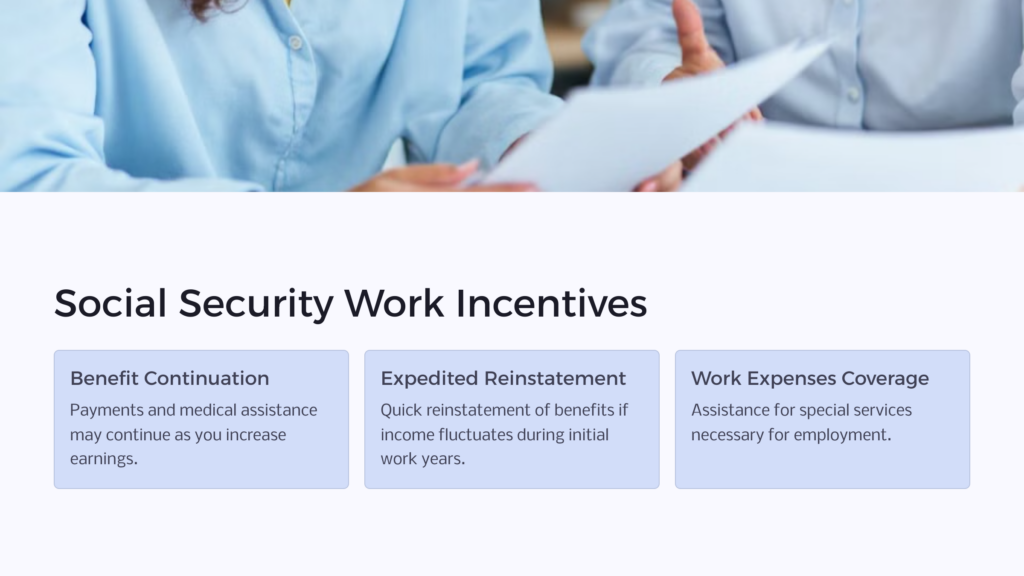Hardly anyone would turn down an opportunity to increase personal income. That is especially true if you have a set income based on social security disability benefits. But many disability recipients believe they will lose their financial and healthcare benefits if they work, or wonder how on earth they can get a job given their disability. This article discusses some issues for you to consider to help evaluate your readiness to take on additional work. Determining if you might return to your previous type of work, exploring possibilities for a new type of work that interests you, thinking about how you can earn additional income, and learning about what you are allowed to earn and do within Social Security benefits guidelines can help positively change your financial and overall wellness.

Many people find that even with a qualified disability they want to rejoin the workforce in some way, discover ways of earning more money than their current benefits provide, or add money to their benefits without significantly reducing the financial assistance they now receive. Whether it is returning to work to your former employment in a reduced or assisted capacity, training for a new vocation, or trying out something completely different than what you have done in the past, there are many different choices for you to consider.
Return to Previous or Similar Work

Are you interested in returning to your former employer or back to the type of work that you did before but in a reduced or supported capacity?
Many people with disabilities left their previous jobs because of their health condition. Over time, your health may improve so that you could return to work on a trial or part-time basis. There may need to be changes in your working conditions, working hours, or specific assignments that could make it possible for you to be successful on the job. In addition, you may require assistive technology, occupational or physical rehabilitation. If you have been out of work for a few years, you may even need additional training to ensure you are up-to-date with the skills needed in your former workplace.
If you think you might be able to return to your previous job, contact your former employer or the Human Resources department to find out the process for returning to work. Make sure you have an updated resume as a document you can use not only to apply for work but also to clarify your qualifications, skills, certifications, experiences, and education that make you a prime candidate for an employer. Are you still in contact with some of your co-workers? If so, you can talk to them about your desire to return to work and discuss any suggestions they have that would be helpful to you in navigating re-employment. In addition, you may be able to use your previous skills at a similar or competing workplace as a new employee. Friends, family, work contacts, and neighbors can all be helpful in addition to searching the Internet and employment sites.
A consideration few people with disabilities may think about is moving to a new location for increased job opportunities. If you find greater opportunities in a different city or state, it might be worth it to consider moving there. In making a decision to move, make sure you include replacing the medical, physical, family, church, or friend support you have currently in place that is essential to your success. Moving can be stressful and exhausting but it may also carry with it a fresh start and the potential for additional resources, both personal and financial, that can improve your situation now and in the future. If a great opportunity to return to work involves moving, these are all important aspects in making a good decision.
Consider too, that there might be similar jobs to the ones you have held that would be suitable to your skills and qualifications. Again, ask someone who is currently working to review your resume, even if it is an informal one, to help you brainstorm additional work possibilities other than the exact job you held previously. For example, if you worked in a printing plant, you may not be able to do the physical work operating the printing machinery but your understanding of the process may make you valuable in sales, client relationships and customer service, quality control, and data collection and analysis within a print shop or other manufacturing facility. If you worked in a school, you may have organization ability, administrative skills, training or development expertise that could transfer into work in medical offices and hospitals, senior living facilities, or child care businesses, among many other possibilities. Keep an open mind about how your abilities might contribute to jobs and work sites with similar demands and expectations than ones you have experienced.
Seek A Different Type of Work
 Is there something you have always wanted to do but didn’t have the time or opportunity to pursue it?
Is there something you have always wanted to do but didn’t have the time or opportunity to pursue it?
Have you ever thought you might like to try something completely new and different from anything you had done before? One of the unique aspects of formal education in the United States is that even higher education is available to anyone at any time if you qualify for admission. If you need special knowledge, skills, and certification through formal training, there are many appropriate programs in an array of fields, such as medical, legal, administrative, technology, education, psychology, and business to name a few. These programs and many others are available at community centers, community and state colleges, universities, and schools both in person or online. If you think you would be interested in a particular area new to you, you can easily do some basic research on the Internet to investigate training and educational opportunities, as well as talk to someone from of these training facilities. There is even a way to get financial help from Social Security for specific education and training for a new career, which we will cover in more detail in the next section.

Another option is to start your own business by tapping into your interests, abilities, skills and knowledge about what goods and services you can provide that people need and want. There are many success stories of people with disabilities starting businesses that allowed them to become more financially independent or to work part-time to supplement their income. From baking to catering, child care to elder care, tutoring to teaching classes, car selection to car repair, pet sitting to grooming, and everything in between, there are hundreds of individuals who started their own business, controlling what they do and how much time and energy they devote to their enterprise, building something valuable and uniquely theirs.
Another type of work that has grown dramatically in the past few years is freelance work. Freelance work can be anything that someone else needs and will pay for on an as-needed basis. Some of the most popular freelance jobs right now are in the areas of transportation, delivery of food and products, and other on-demand services. There are also doctors, attorneys, teachers, programmers, writers, editors, landscapers, and others who make up the nearly 30 million people in the US who are employed currently as a freelancer. The flexibility of freelance work may appeal to you as it gives you opportunities to work when you want to with no penalty (as long as you are not in the midst of a job) for taking a break from work for as long as you like. Check out the resources section of this article for ways to get started investigating freelance possibilities for you.
Maximize Social Security Benefits and Assistance

Do you have the facts about how working can enhance or affect all of your benefits?
The Social Security Administration guidelines have recently changed to encourage and assist people with disability benefits to add part-time or full-time employment income and get training assistance for new opportunities. A common misconception is that you will lose your disability benefits if you report to the Social Security Administration that you are looking for or going back to some kind of work. Actually, Social Security can be a big help to you in the process of obtaining, training for, or starting back to work. There are special programs for people who receive Social Security Disability benefits or Supplemental Security Income (SSI) that include:
Work incentives, such as continuation of benefit payments and medical assistance while you grow your income earnings and even expedited reinstatement of any benefits that might change as your income fluctuates during the initial years you may begin work. You may also qualify for expenses to help pay for special services necessary for you to work based on your medical condition. These expenses, such as transportation, childcare, resume writing and job coaching, equipment and uniforms, and supplies for starting your own business can also be provided through a special savings plan under a program called Plan to Achieve Self-Support (PASS).
Another program under the Social Security Administration, called The Ticket To Work program, offers vocational rehabilitation that includes assessing your ability to work at certain jobs and working with you to enhance or develop needed skills. The program also offers education and job training plus referrals to possible employers in your geographic location. There is a special phone line you can call to talk to someone about the details of this program at 1-866-968-7842 with additional information at ssa.gov/work.
There are different regulations regarding how much you can earn without changing your benefits and the length of time your benefits can continue as you build your income. These can vary from state to state and based on the type of benefits you receive. The best thing to do is to think about what you want to do and how you plan to do it, even if your plan is not fully developed. Then contact Social Security (1-800-772-1213 or 1-800-325-0778 if you are deaf or hard of hearing) or visit their website (ssa.gov) to learn as much as you can. You will not be penalized in any way for speaking to someone about the programs listed here and any other suggestions about how to approach your potential re-entry into the workforce. In fact, you will be surprised at the generosity of the program in providing you with a safety net of substantial financial and other support to help you. In addition to the federal programs, each state and even many communities have dynamic programs specifically designed to make a transition to work doable for people with a wide variety of disabilities.
If you feel that adding work to your life can improve your financial and social well- being, it is certainly worth investigating the many opportunities that are waiting for you. While you may not have considered ever returning to work, the prospect of exploring new possibilities in today’s economy along with the available support may propel you to take some time to investigate what this could mean to you.
Good luck in your research and come back for additional information and support about how you can add significant income to your financial situation.
 Benefits.com Advisors
Benefits.com Advisors
With expertise spanning local, state, and federal benefit programs, our team is dedicated to guiding individuals towards the perfect program tailored to their unique circumstances.
Rise to the top with Peak Benefits!
Join our Peak Benefits Newsletter for the latest news, resources, and offers on all things government benefits.



















